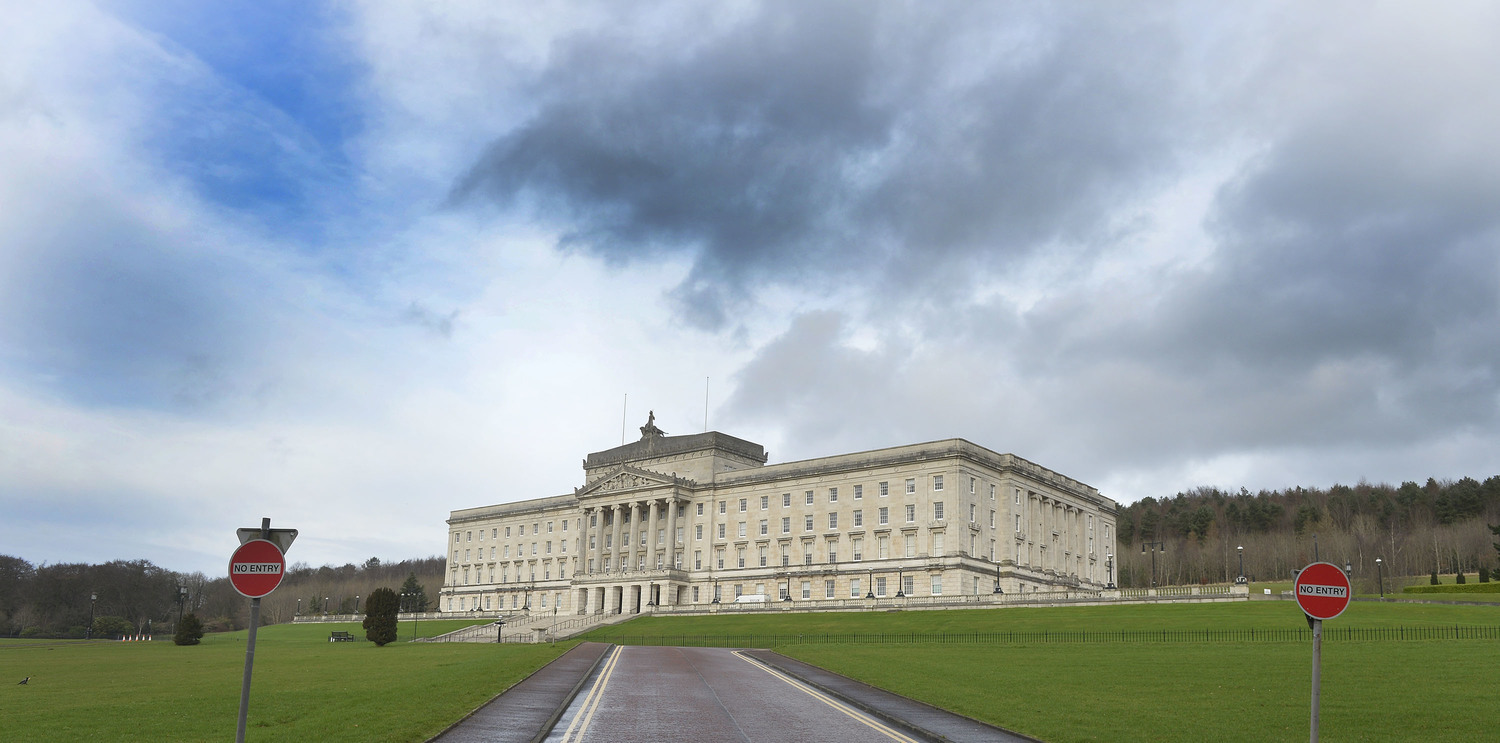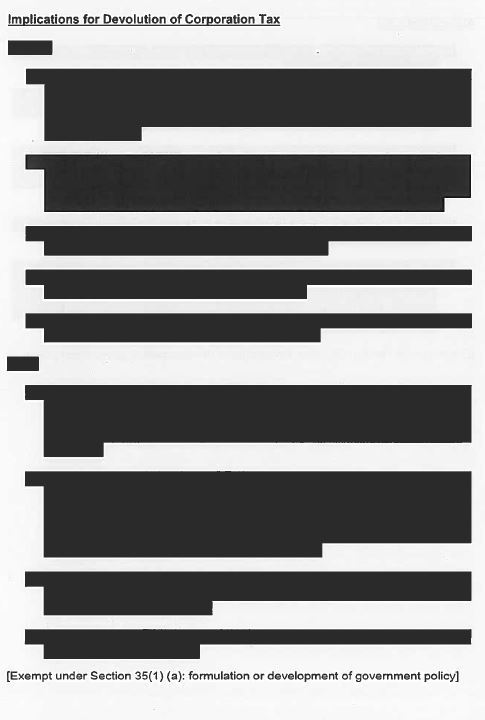NORTHERN Ireland’s most senior civil servants have produced research outlining the impact a lack of EU funding will have across Stormont Departments.
Internal emails show that within hours of the UK decision to leave the European Union (EU), the head of the civil service Sir Malcolm McKibbin asked the permanent secretary of each department for reports “identifying, as best we can at this early stage, the implications of the EU referendum result”.
The Detail used Freedom of Information (FOI) legislation to obtain the documents, but while five departments refused to release files claiming it would affect the "formulation of government policy”, four departments did release the research revealing a series of issues including:
- Potential loss of access to EU funding opportunities including €31.8 million up to 2020 from the " Interreg VA Health and Social Care Call ";
- Concerns over the ability to recruit European nurses required to cover “current shortages", or recruit doctors the health department said it is “currently relying on”;
- “Severe consequences” on the Department for Infrastructure’s budget that could jeopardise major building projects;
- Potential cost implications of tariffs on vehicles and supplies coming from the EU and issues regarding cross border travel as well as the impact on North/South government bodies and investment;
- Difficulties relating to the sharing of intelligence, including criminal records and missing persons, as well EU oversight on issues such as human trafficking would end;
The Detail sought information from all nine Stormont departments but only four agreed. Some released papers which are heavily redacted, including a section from the Department of Finance’s paper entitled the “Implications for Devolution on Corporation Tax” which is completely redacted.
The latest concerns over the impact of Brexit come after The Detail previously obtained a report by Stormont’s EU experts which was prepared a year before the referendum and which raised concerns that Brexit could cause major economic difficulties.
The reports commissioned by Sir Malcolm Mckibbin were compiled after the decision to exit the EU.
Last week British Prime Minister Theresa May triggered Article 50 which will now see negotiations regarding the UK’s separation from the EU.
BREXIT'S IMPLICATIONS
In the aftermath of the EU referendum result last June The Detail sent a series of Freedom of Information requests to each Stormont department requesting a copy of all internal correspondence on “Brexit” - Britian's exit from the EU.
The files that were released included the letter from Sir Malcolm McKibbin to permanent secretaries on June 24 2016, the day after the referendum result.
In October last year The Detail sought copies of those reports.
The Department of Health initially refused but later released a document entitled “potential implications of leave vote for health and social care” completed on June 29 2016.
The document outlined the implications for EU directives that allow freedom of movement for health and social care professionals across the EU.
It stated: “There is a query over the future of professionals from the EU being recruited to and working in the H&SC system. For example, we are currently recruiting in Italy and Romania for nurses due to current shortages. Those nurses offered work may now think twice about accepting.
“We are also currently relying on doctors from the EU and any future restrictions would impact negatively on what is already a shortage situation.”
The impact on potential fluctuations in the exchange rate caused by Brexit were also highlighted. The document pointed to a €8 million payment from Republic of Ireland towards the construction of the Altnagelvin radiotherapy project as an example.
Within the document department officials also pointed out that there are a range of European funding opportunities of which the Department of Health can avail.
The document focused on the impact Brexit could have on funding drawn from the EU for structural funds from the “Interreg VA Health and Social Care Call”.
The programme has a total value of €53million and covers Northern Ireland, the Republic of Ireland and Scotland.
The authors of the document estimated that Northern Ireland could benefit from €31.8million in the period up to 2020 but warned that leaving the EU may cause “uncertainty in the sector about the availability of this funding”.
A summary of the potential Brexit financial implications identified by health officials is published in the annex of the department's Brexit document and can be viewed in full by clicking here. See below for an example of a table contained in the annex.
Questions were also raised about the impact on the EU-wide surveillance of infectious diseases. The European Centre for Disease Control is an EU body and the document said that the implications for the surveillance of diseases or for professional training are unknown.
The issue of medication prescriptions was also highlighted. Currently legislation allows prescriptions written by a medical professional from another EU country to be dispensed in the UK. The document stated that this arrangement may need to be considered in the light of future agreements with the EU.
The research also flagged up the fact that there may be issues for older people returning to the UK from the EU to access social care once their entitlements under EU law expire.
DETRIMENTAL IMPACT
The Department for Infrastructure also initially refused to release its Brexit document under FOI but a copy was released by its press office when we contacted it about this story, as had also happened with the department of health.
The Department for Infrastructure’s (DFI) document entitled “Implications of EU Referendum Results” states that the loss of EU funding would have “detrimental impacts on DFI budgets”. The paper outlined concerns that, as budgets are already constrained, further pressure would have “severe consequences”.
It pointed to the fact that there would now be major uncertainty about the potential to secure EU funding for major infrastructure projects such as the York Street Interchange in Belfast.
In January this year the then Infrastructure Minister Chris Hazzard announced £4million funding towards the York Street Interchange but it is estimated the project will cost up to £130milllion.
Infrastructure officials also stated in the report that Brexit could have implications for the Blue Badge Scheme that provides a wide range of parking concessions for people with severe mobility problems.
There are currently over 120,000 blue badge holders in Northern Ireland and badge holders can use the scheme when parking in a member country of the EU. The report said that Brexit could potentially mean that these would now not be valid outside the UK and there may be a requirement to withdraw the current badge and issue new badges with EU references deleted.
It also highlighted potential cost implications of tariffs on vehicles and supplies coming from the EU and the issue of cross-border travel is also raised.
The document stated: “Operational issues for Translink in relation to its cross-border train and bus services (provided in partnership with larnród Éireann and Bus Éireann) due to potential changes to border controls if implemented. Operationally this is likely to be very difficult.”
The Department for Infrastructure paper also pointed out that post-Brexit there could be strict regulations imposed on emigration which could affect the management of port security at Strangford and Portaferry harbours.
In a statement to The Detail a spokesperson for the Department for Infrastructure said its Brexit paper was "produced at short notice following the referendum and the scale and likelihood of the impacts will change over time as there is greater clarity about the form Brexit will take”.
The Department of Finance’s Brexit implications paper was issued on the June 28 2016 and released to The Detail at the end of last year in response to our initial FOI request.
The document is heavily redacted but it does highlight concerns about the impact Brexit will have on north/south bodies and investment.
In relation to North/South bodies the document stated: “The UK withdrawal from the EU will create some difficult questions for the North/South Bodies. These questions include the legal framework within which they must work, procure, employ etc.”
The paper outlined that the Northern Ireland Executive had committed to establishing an investment fund working in collaboration with the European Investment Bank (EIB). Concerns were raised that Brexit may “significantly alter the extent to which the EIB will engage on this project moving forward”.
Northern Ireland has benefitted from four European Structural Fund Programmes (2014-20). The Department of Finance’s Brexit paper contained a table detailing how much EU funding was allocated to each of these programmes (see below).
In a statement to The Detail a spokesperson for the Department of Finance said all public interest implications as outlined under FOI legislation were considered before any redactions were made.
The Department of Justice responded to The Detail’s FOI request at the end of last year and released a redacted version of the paper entitled “UK Referendum on EU Membership – Possible Implications for the Administration of Justice in Northern Ireland”.
Justice officials raised queries about whether or not the sharing of information on criminal records and the recovery of criminal assets could continue across member states following Brexit.
Continued co-operation between the north and EU countries on prisoner transfers is also flagged up and the fact that EU oversight on issues such as human trafficking would end as a result of Brexit.
Doubt was also cast over whether or not cooperation between Northern Ireland and member states in the event of crisis situations would continue post Brexit, such as the use police officers to travel overseas to offer support.
“SIGNIFICANTLY WEAKEN THE UK’S BARGAINING POSITION”
Five Stormont departments refused to release the research.
In each case we asked the departments to internally review their decision not to release the information and we contacted their press offices individually before publishing this story.
In its response the Department of Agriculture Environment and Rural Affairs confirmed it held the information but said that disclosure could “significantly weaken the UK’s bargaining position in international negotiations”.
Northern Ireland’s farming sector is heavily reliant on support from Europe, with direct EU payments to farmers representing 87% of annual farm income, as previously reported here.
The Department of Education concluded that releasing the information would not be in the public interest because “it would negatively impact on the policy formulation process by removing the appropriate space for officials and the Minister to develop policy”.
The Department for Communities said the release of the information would prejudice “the effective conduct of public affairs”, while the Department for Economy said the information was being withheld as it related to “the ongoing formulation of government policy.”
The Executive Office stated that while disclosure of its Brexit report would better inform the public of the government’s considerations and actions, it stated that there was a significant risk that disclosure would “inhibit Ministers and officials being able to engage in free and frank discussion of policy options internally”.
The five departments which refused to release the Brexit papers had DUP ministers at the time a response was issued to The Detail including - the Department for Communities, Economy, Education, Agriculture and The Executive Office. The Executive Office also included ministers from Sinn Féin.
Northern Ireland’s political parties are currently engaged in talks to restore the power-sharing executive after the recent Assembly Election ended the unionist majority at Stormont, with Sinn Féin now just one seat behind the DUP.
 By
By




